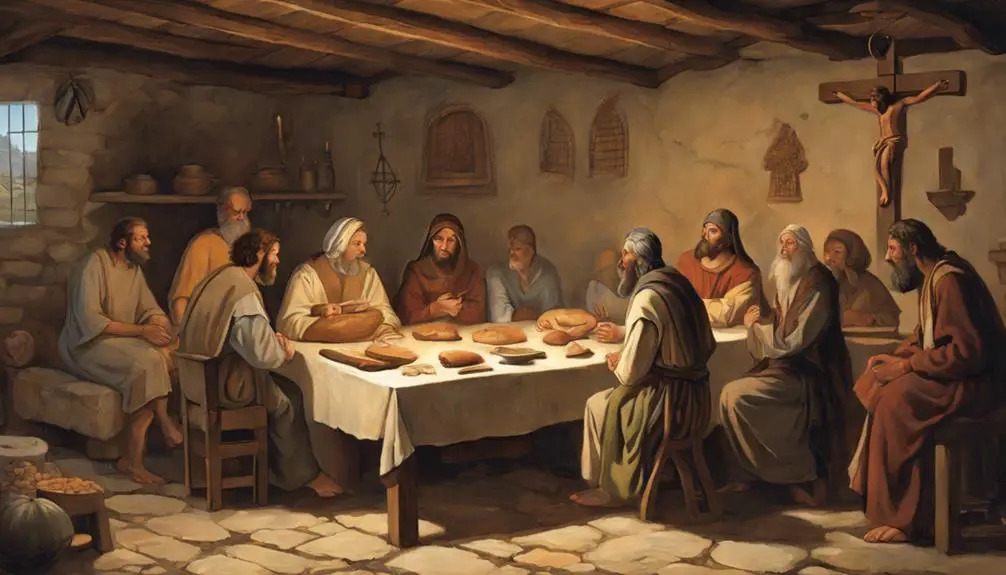Opening the gateway to Paul's profound teachings, the Book of Acts unveils the early church's trials and triumphs—dive in to discover more.

Book Before Romans in the Bible
Just as the dawn precedes the day, the Book of Acts sets the stage before you encounter Paul's Epistle to the Romans. You're about to journey through the tumultuous yet inspiring early Christian life, witnessing the fervent spread of the gospel post-Christ. Acts serves as a crucial bridge, connecting the Gospels to the teachings that shape much of Christian doctrine.
With its rich tapestry of key themes, notable figures, and pivotal events, this book offers a deeper understanding of the transition into Paul's epistles. Let's explore together how Acts not only narrates but also lays the groundwork for the theological discussions to come.
Key Takeaways
- Acts links the Gospels to Paul's Epistles, setting the stage for Romans.
- It details early Christianity's expansion and Paul's pivotal conversion.
- Acts navigates early Christian community challenges before the doctrinal depth of Romans.
- Transitioning from Acts to Romans showcases the evolution of Christian thought and leadership.
Historical Context of Acts

To fully grasp the significance of Acts, it's crucial to delve into its historical backdrop, which sets the stage for the early Christian movement's expansion after Jesus' resurrection. You're entering a period where Roman influence pervades every aspect of societal structure, politics, and even religious practices across the vast empire. This omnipresent Roman backdrop is instrumental in understanding how the new Christian faith navigated and sometimes clashed with existing power structures.
Simultaneously, you can't overlook the deep-rooted Jewish customs that form the bedrock of early Christian practices. The apostles and first Christians were, after all, Jews themselves, deeply entrenched in Jewish traditions and laws. Their efforts to spread Jesus' teachings weren't just revolutionary religious acts; they were also navigating the complex interplay of adhering to their Jewish roots while embracing the radical inclusivity and transformation proposed by Christianity.
This intricate dance between maintaining Jewish customs and adapting to or resisting Roman influence provides a nuanced foundation for Acts. As you dissect Acts, remember you're not just looking at the birth of a religion. You're witnessing a cultural and religious negotiation, where early Christians sought to carve out their identity amidst two dominant forces: the all-encompassing Roman empire and the deeply ingrained Jewish traditions.
Key Themes Explored

Exploring key themes in Acts reveals how early Christians navigated the complexities of their faith amidst Roman and Jewish influences. At the heart of this exploration are the intertwined themes of faith journeys and prophecy fulfillment, which offer a rich tapestry for understanding the early church's development.
Faith journeys in Acts aren't just personal spiritual odysseys but also collective experiences that shaped the Christian community's identity. You'll notice that these journeys often involve significant challenges, including persecution, internal disputes, and the task of integrating Gentile converts. These narratives underscore the dynamic and evolving nature of faith, emphasizing resilience and adaptation in the face of external pressures.
Prophecy fulfillment serves as a pivotal theme, reinforcing the legitimacy and continuity of the Christian message. Acts meticulously documents how Jesus' life and the establishment of the church fulfill Old Testament prophecies, asserting a divine plan unfolding through history. This theme not only validates the Christian faith to its Jewish audience but also frames the church's mission in a broader, cosmic context.
Together, these themes offer a nuanced understanding of how early Christians interpreted their experiences and articulated their place within a larger religious and historical narrative.
Notable Figures and Events

Building on the understanding of key themes, it's essential to examine the notable figures and events that shaped the narrative of Acts, as these elements further illuminate the early Christian community's evolution and challenges. Among these, the effort towards Temple rebuilding underlines a pivotal period of renewal and spiritual re-centering for the Jewish people. This endeavor not only represented a physical restoration but also a symbolic reaffirmation of faith and identity amidst external pressures and internal disputes.
Furthermore, Samuel's leadership stands out as a cornerstone in the transition from a tribal confederation to a more centralized form of governance under monarchy. His role as prophet, judge, and leader encapsulates the complexities and contradictions inherent in this transformative era. Samuel's actions and decisions, from anointing the first king of Israel to confronting the moral and spiritual dilemmas of his time, underscore the intertwined nature of religious and political evolution in the biblical narrative.
These events and figures, among others, are critical in understanding the fabric of the early community's faith, struggles, and governance. Their stories provide a rich tapestry from which one can draw insights into the dynamic interplay between divine providence and human agency.
Acts and Early Christian Life

The book of Acts offers a vivid portrayal of early Christian life, highlighting the community's enduring faith amidst persecution and its pivotal role in spreading Christianity beyond Jewish boundaries. This account provides a deep insight into the communal and ritualistic aspects that defined the nascent Christian movement. The community structure, as delineated in Acts, reveals a collective that prioritized communal support, sharing possessions to ensure no member faced want. This practice underscored a radical departure from traditional societal norms, emphasizing a new social ethic based on mutual care and equality.
Christian rituals, particularly baptism and the breaking of bread, emerge as central rites within Acts, symbolizing initiation and fellowship respectively. These rituals not only marked the boundaries of the community but also facilitated a sense of belonging and identity among early Christians. The methodical arrangement of communal life and the structured approach to worship and ritual observance were crucial in maintaining cohesion and identity within the early Christian community, especially in the face of external pressures and persecution.
Through this analytical lens, Acts presents a detailed account of how early Christians navigated their socio-religious landscape, forging a distinct identity while expanding their spiritual horizons.
Transition to Paul's Epistles

After examining the communal and ritualistic foundations of early Christian life in Acts, we now turn our attention to Paul's Epistles, which offer a deeper understanding of theological concepts and the challenges of Christian leadership. Paul's writings, deeply embedded with his personal experiences and revelations, provide insightful analysis into the early church's doctrines and the hurdles it faced in spreading the Christian message.
- Paul's conversion: A pivotal moment that not only transformed his life but also marked a significant turning point in the spread of Christianity.
- Missionary journeys: Paul's extensive travels played a crucial role in the establishment and support of early Christian communities across the Roman Empire.
- Theological insights: Through his letters, Paul delves into complex theological issues, offering guidance and clarification to the early believers.
- Leadership challenges: Paul's Epistles reveal the practical challenges of leading a diverse and often divided early Christian community.
These aspects of Paul's life and work are critical for understanding the transition from the communal narratives of Acts to the more personal, doctrinal, and leadership-focused tones found in his Epistles.
Frequently Asked Questions
How Does the Book Before Romans Address the Concept of Prophecy and Its Fulfillment in the New Testament?
You're diving into how prophecy sources and interpretation methods shape understanding of New Testament fulfillment.
This inquiry requires analyzing how prophecies were communicated and subsequently interpreted.
You'll explore various techniques used to decipher these ancient predictions, considering both the linguistic and cultural contexts.
Are There Any Specific Dietary or Cultural Practices Mentioned in the Book Before Romans That Differed Significantly From Those Observed by Early Christians in Acts?
You'll find that the text addresses dietary and cultural practices distinctly, especially concerning feast regulations and Gentile inclusion. These practices differ notably from those observed in Acts, where early Christians navigated a new cultural integration.
The emphasis on specific dietary laws and the inclusion of Gentiles into a traditionally Jewish observance underscore a broader theme of unity and diversity, marking a significant shift in early Christian community practices and beliefs.
How Is the Relationship Between Faith and Works Discussed in the Book Preceding Romans, and How Does It Compare to Paul's Later Writings?
You're delving into how faith dynamics and works comparison are discussed in a significant text, contrasting it with Paul's later writings. The earlier discussion emphasizes faith as foundational, yet it intricately ties to works as evidence of that faith.
Unlike Paul's more nuanced view where faith is paramount, here, there's a more balanced interplay, suggesting both elements are crucial in a believer's life.
This analysis highlights the evolving understanding of faith and works within early Christianity.
Can We Find Any References or Allusions to Non-Jewish Religions or Philosophies in the Book Before Romans, and How Do They Impact the Narrative or Teachings?
You won't find explicit mentions of Greek philosophy or direct idolatry references in Acts, the book preceding Romans. However, the narrative subtly engages with non-Jewish beliefs through its depiction of Paul's interactions with various cultures.
This approach highlights early Christianity's relationship with the surrounding non-Jewish philosophies, showing a nuanced understanding rather than outright condemnation.
It's a methodical examination of how those interactions shaped the early church's teachings and identity.
What Role Do Women Play in the Book Before Romans, and How Does Their Portrayal Contribute to Our Understanding of Their Status in Early Christian Communities?
In analyzing gender dynamics and leadership roles, you'll find that women's involvement illuminates their status within early Christian communities. Their portrayal, often nuanced and complex, suggests a varied acceptance and participation in religious and societal spheres.
Conclusion
In conclusion, you've explored the rich tapestry of Acts, positioned just before Romans, providing crucial historical context and thematic bridges.
Through its narratives, you've delved into the early Christian life, significant figures, and pivotal events that shaped the nascent church.
This book not only sets the stage for understanding Paul's Epistles but also offers profound insights into the transition from Jewish roots to a burgeoning Christian identity, underscoring its indispensable role in biblical scholarship and Christian theology.



Sign up